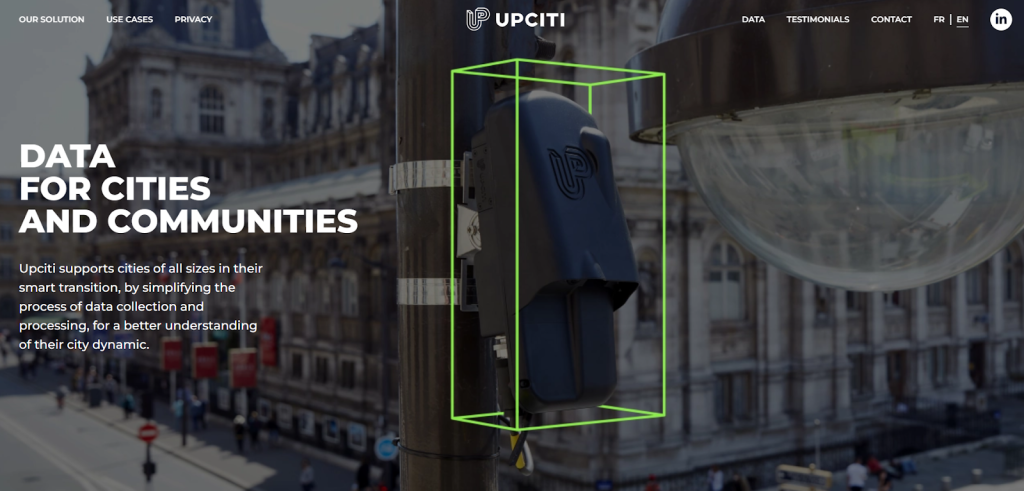
Smart-city sensor platform Upciti has closed a $20 million Series A financing led by Notion Capital, Point Nine, and Chalfen Ventures. This fresh runway will enable the company to scale its data-collection sensors and analytics infrastructure for cities looking to manage traffic, mobility, parking, and environmental monitoring more intelligently.
Founded to make data-driven urban planning easier and more privacy-respectful, Upciti’s solution operates at the intersection of hardware, software, and civic infrastructure. With over 2,000 sensors deployed and more than 100 projects live, the company is scaling up its mission to power smarter, more responsive cities.
Transforming City Infrastructure with Real-Time Insight
Upciti’s core product is a multi-use sensor that collects data across key urban metrics - parking occupancy, vehicle counts, people flows, bulky waste detection, and even sound levels. Those sensors link into a real-time analytics dashboard that city managers and private stakeholders can use to visualize trends, run planning simulations, and drive operational decisions.
Because the hardware is designed with privacy-by-design (no personally identifiable data, anonymized by default), cities can deploy Upciti without running afoul of regulatory or civic concerns. The system supports multiple use-cases from a single device, which makes scaling cost-effective and deployment-friendly.
Scaling with Impact
With its Series A round closed, Upciti is now positioned to accelerate sensor production, expand into new markets (likely across Europe and beyond), and build deeper partnerships with city governments and private infrastructure players. It will also deepen its software tools - analytics, forecasting, and dashboarding - so urban planners can move from retrospective reporting into proactive decision-making.
As urban populations grow and mobility becomes more complex, cities increasingly need instruments that go beyond passive measurement - they need predictive visibility. Upciti plans to lean into that demand by advancing its hardware-software stack so that a parking decision today can respond dynamically to tomorrow’s traffic flow projections.
The Insight Hidden in Smart Cities
Beneath Upciti’s tech and fundraising lies a subtle but essential truth for founders building in IoT / hardware + software spaces: deployability is the most powerful product feature you often don’t see. It’s not how clever your sensor is - it’s how easily it becomes part of someone else’s operations.
Upciti didn’t just build a versatile sensor; it built a deployment-first architecture. That means designing for installation logistics, regulatory alignment, partner consent, and maintenance-free operation - all before thinking about scale.
The real gravity of this decision shows up in contracts and speed-to-deployment. When a city planner can agree on hardware that “just works without requiring weekly checks,” you win not on specs, but on operations trust. In hardware-enabled startups, founders must ask: is my product easy to understand, install, and forget? Because once it’s forgotten (i.e. it doesn’t cause nightmares), you’ve become infrastructure.
That insight isn’t glamorous. It doesn’t land on pitch decks. But founders who bake deployability - ease, reliability, and partner-friendly operations - into their roadmap create a moat no algorithm can beat. Upciti’s momentum shows how that consideration compounds faster than feature velocity.
Competitive Positioning in the Smart City Landscape
In recent years, urban tech has exploded - sensors, dashboards, digital twins. But many of those solutions struggle with integration, regulatory friction, and maintenance overhead. Upciti stands out by combining real-time measurement, multi-use sensor design, and negligence-free deployment with the capital needed to scale faster.
As cities aim to cut congestion, reduce pollution, and improve livability, vendors that can prove reliable, responsive data at scale are winning tenders and budgets. Upciti is now one of those vendors, well-capitalized to compete with legacy infrastructure and newer entrants alike.
What’s Next for Upciti
Going forward, Upciti will likely focus on new geographies, extended analytics offerings (e.g. predictive traffic flow modelling, environmental compliance monitoring), and deeper integrations with city management platforms such as building / utilities management, public works, urban mobility apps, and possibly public dashboards for citizen-facing services.
The capital from Notion Capital, Point Nine, and Chalfen Ventures gives them runway not just to grow sensors, but to refine what “city intelligence” means - moving from visibility into action. It also places them at an inflection point where they can shift from “smart cities” to “responsive cities.”
When infrastructure demands shift from reactive fixes to anticipatory changes, Upciti appears poised to lead that transition - sensors ready, dashboards live, funding secured.









